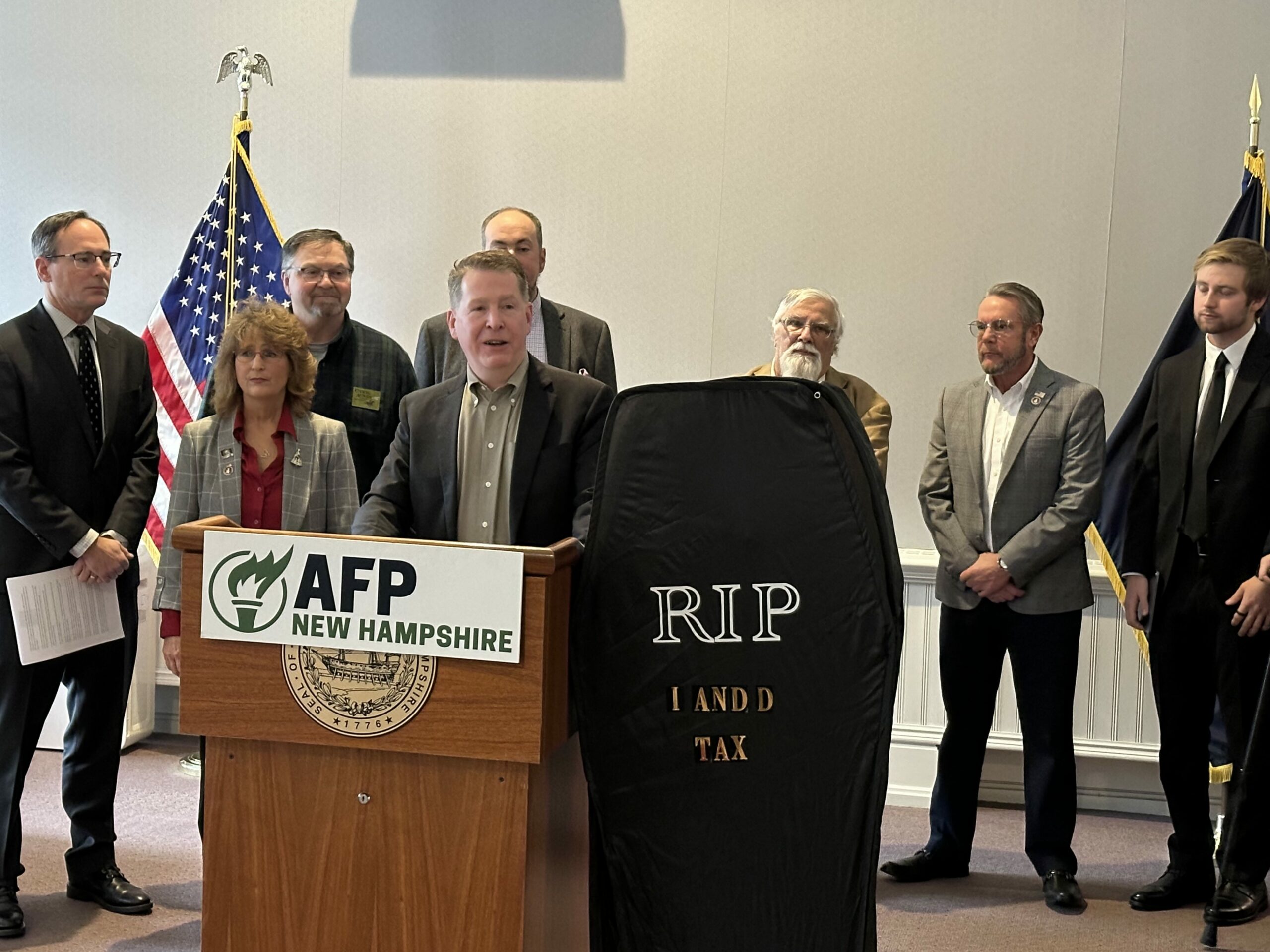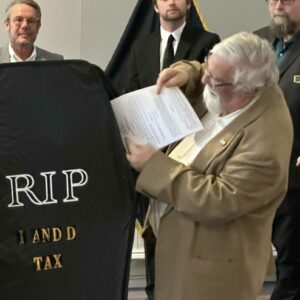New Hampshire Republicans joined fiscal conservative groups Monday for a mock funeral marking the end of the state’s last remaining income tax, an event that even included a casket marked ‘RIP I and D Tax.”
The tax in question, the state’s tax on income from interest and dividends, will expire on midnight Tuesday as the new year begins, thanks to legislation passed by the GOP-controlled legislature and signed by Gov. Chris Sununu (R) last year.
“On Wednesday, New Hampshire truly becomes income tax-free,” said Speaker of the House Sherm Packard (R-Londonderry). “In fact, on Wednesday the Granite State will become one of only two states, along with Alaska, which no longer has an income or a sales tax.”
And because Alaska allows local sales taxes, Packard added, “When Granite Staters wake up Wednesday morning, they will be the only people in the country who can truly say their state is income and sales tax free.”

Greg Moore with Americans for Prosperity hosts a mock funeral for New Hampshire’s interest and dividends tax on December 30, 2024.
Majority Leader Jason Osborne was also on hand to offer his less-than-fond farewells.
“I think this is my favorite funeral that I’ve ever been to. I want to thank everyone for gathering together with us to celebrate the slaying and burial of the interest and dividends income tax,” Osborne said.
Democrats, on the other hand, decried the end of the income tax and its revenue.
“While regular people struggle with rising costs in housing, child care, health care, groceries and basics, we should not be celebrating tax policies that only benefit the wealthiest,” House Democratic Leader Alexis Simpson (D-Exeter) said in a statement.
Democrats argue ending the income tax will result in higher property taxes by shifting the cost of government services to the local level, thus driving up property taxes.
“Gov.-elect Kelly Ayotte and state Republicans must be transparent for New Hampshire residents: What vital programs are they going to cut to balance the budget? Will they be willing to once again raise your property taxes by cutting state funding to education, health care, and childcare — all to help the rich get richer?” added Senate Democratic Leader Rebecca Perkins Kwoka (D-Portsmouth).
Nonsense, said Drew Cline, president of the Josiah Bartlett Center for Public Policy. At Monday’s press conference, he pointed out state revenues for fiscal year 2024 are more than $1 billion higher than in 2014.
“Does that sound like a revenue problem to you?” Cline asked.
The income and dividends tax became a top issue in the race for governor earlier this year when Democrat Joyce Craig said she wanted to bring the income tax back, and she attacked Republican Kelly Ayotte for supporting its repeal. Lucas Meyer, a Democratic strategist and Craig supporter, told radio host Jack Heath that not only did Granite States oppose repealing the tax, but that “this is a tax people probably want to pay.”
Craig went on to lose to Ayotte by more than nine points.
“Of all the attacks against Joyce Craig when she was running… the polls show that this was the most unpopular thing,” said Greg Moore with Americans For Prosperity, whose organization hosted Monday’s presser. “Even more so than sanctuary cities, even more so than being associated with Massachusetts.”
Both Democrats and Republicans acknowledged the tax brought in more than $184 million in the latest fiscal year (“New Hampshire’s 7th largest state tax revenue source,” Democrats noted in their press release). But Republicans argued that was due in part to soaring interest rates under the Biden administration.
“I think with Trump coming in, the economy is going to roar back quite quickly,” said Rep. Keith Ammon (R-New Boston). “We’re not going to have to worry about budget.”
As for critics’ claims that the state’s lack of revenue is driving local governments to raise property taxes, Republicans point out the current budget includes the highest ever amount of state aid to local governments — including record state school aid appropriations.
Democrats claim cutting interest and dividends taxes will “only benefit the wealthiest.” But according to 2021 data from the New Hampshire Department of Revenue Administration, of the 71,259 tax returns reporting I&D income, 61 percent paid $500 or less in taxes on it. Given the five percent tax rate at the time, that means they had $10,000 or less in I&D revenue.
About a third of those filers paid nothing, meaning their income fell below the exemption level ($2,400 for an individual, or $4,800 for a married couple.)
And if Democrats truly believe the interest and dividends tax is needed, they have yet to act on that belief, Moore said.
“There have been almost 1,000 LSRs (Legislative Service Requests) filed so far for 2025,” Moore noted. “Of those nearly 1,000 LSRs that are public at this point, none of them involve bringing back the tax on interest and dividends income. So we can see that this is a very popular move.”
And Ayotte believes Democrats should take the hint.
“The Democrats should leave their support for higher taxes in 2024,” said Ayotte spokesman John Corbett. “Voters were loud and clear in November — they do not support the Democrats’ income tax. Gov.-elect Ayotte will oppose all efforts to resurrect this income tax on small businesses, retirees, and those saving for retirement.”





